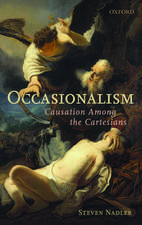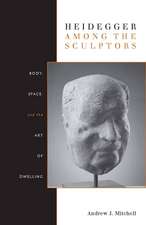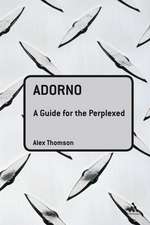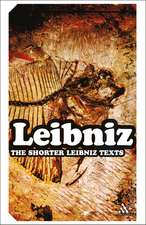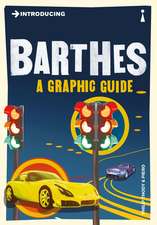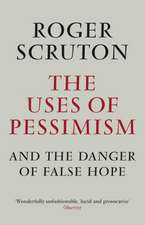Nietzsche: An Introduction: Athlone Contemporary European Thinkers
Autor Gianni Vattimo Traducere de Nicholas Martinen Limba Engleză Paperback – 27 mar 2002
| Toate formatele și edițiile | Preț | Express |
|---|---|---|
| Paperback (2) | 194.45 lei 3-5 săpt. | |
| Stanford University Press – 10 apr 2002 | 194.45 lei 3-5 săpt. | |
| Bloomsbury Publishing – 27 mar 2002 | 434.23 lei 6-8 săpt. | |
| Hardback (2) | 701.35 lei 6-8 săpt. | |
| Stanford University Press – 10 apr 2002 | 701.35 lei 6-8 săpt. | |
| Bloomsbury Publishing – 27 mar 2002 | 1123.63 lei 6-8 săpt. |
Din seria Athlone Contemporary European Thinkers
- 28%
 Preț: 493.77 lei
Preț: 493.77 lei - 27%
 Preț: 538.67 lei
Preț: 538.67 lei - 27%
 Preț: 600.46 lei
Preț: 600.46 lei - 37%
 Preț: 434.45 lei
Preț: 434.45 lei - 27%
 Preț: 376.86 lei
Preț: 376.86 lei - 28%
 Preț: 496.97 lei
Preț: 496.97 lei - 19%
 Preț: 464.79 lei
Preț: 464.79 lei - 36%
 Preț: 874.36 lei
Preț: 874.36 lei - 37%
 Preț: 930.25 lei
Preț: 930.25 lei - 36%
 Preț: 340.58 lei
Preț: 340.58 lei - 28%
 Preț: 461.77 lei
Preț: 461.77 lei - 36%
 Preț: 342.94 lei
Preț: 342.94 lei - 14%
 Preț: 538.26 lei
Preț: 538.26 lei - 11%
 Preț: 497.06 lei
Preț: 497.06 lei -
 Preț: 199.10 lei
Preț: 199.10 lei - 14%
 Preț: 176.25 lei
Preț: 176.25 lei - 41%
 Preț: 117.32 lei
Preț: 117.32 lei - 43%
 Preț: 110.29 lei
Preț: 110.29 lei - 36%
 Preț: 156.79 lei
Preț: 156.79 lei -
 Preț: 223.76 lei
Preț: 223.76 lei - 24%
 Preț: 189.07 lei
Preț: 189.07 lei - 52%
 Preț: 136.35 lei
Preț: 136.35 lei
Preț: 434.23 lei
Preț vechi: 536.24 lei
-19% Nou
Puncte Express: 651
Preț estimativ în valută:
83.12€ • 90.31$ • 69.86£
83.12€ • 90.31$ • 69.86£
Carte tipărită la comandă
Livrare economică 21 aprilie-05 mai
Preluare comenzi: 021 569.72.76
Specificații
ISBN-13: 9780485121186
ISBN-10: 0485121182
Pagini: 288
Dimensiuni: 140 x 216 x 15 mm
Greutate: 0.33 kg
Editura: Bloomsbury Publishing
Colecția The Athlone Press
Seria Athlone Contemporary European Thinkers
Locul publicării:London, United Kingdom
ISBN-10: 0485121182
Pagini: 288
Dimensiuni: 140 x 216 x 15 mm
Greutate: 0.33 kg
Editura: Bloomsbury Publishing
Colecția The Athlone Press
Seria Athlone Contemporary European Thinkers
Locul publicării:London, United Kingdom
Cuprins
Part I: From Philology to Philosophy
1. How Nietzsche is to be read.
2. From Philology to Philosophy as Cultural Criticism.
Part II: The Deconstruction of Metaphysics
3. Art and Science.
4. The Self-sublimation of Morality.
5. The Philosophy of Morning.
Part III: The Philosophy of Zarathustra
6. Morning and Noon.
7. Nihilism, Eternal Recurrence, Decision.
8. Redemption from Time.
9. The Will to Power and the Fate of the Subject.
10. The Will to Power as Art.
Part IV: Chronology of Nietzsche's Life and Works.
Part V: History of Nietzsche's Reception.
1. How Nietzsche is to be read.
2. From Philology to Philosophy as Cultural Criticism.
Part II: The Deconstruction of Metaphysics
3. Art and Science.
4. The Self-sublimation of Morality.
5. The Philosophy of Morning.
Part III: The Philosophy of Zarathustra
6. Morning and Noon.
7. Nihilism, Eternal Recurrence, Decision.
8. Redemption from Time.
9. The Will to Power and the Fate of the Subject.
10. The Will to Power as Art.
Part IV: Chronology of Nietzsche's Life and Works.
Part V: History of Nietzsche's Reception.
Recenzii
“This is the best short work on Nietzsche I have come across. It provides a rich understanding and convincing interpretation of Nietzsche's work from his first published book through the notes of his last productive years. Vattimo also demonstrates an encyclopedic knowledge of more than a century of European Nietzsche scholarship.”—Christopher Cox, Hampshire College
Notă biografică
Gianni Vattimo is Professor of Philosophy at the University of Turin. Among his books translated into English is Religion (edited with Jacques Derrida) (Stanford, 1998) and Beyond Interpretation: The Meaning of Hermeneutics for Philosophy (Stanford, 1997).
Textul de pe ultima copertă
“This is the best short work on Nietzsche I have come across. It provides a rich understanding and convincing interpretation of Nietzsche's work from his first published book through the notes of his last productive years. Vattimo also demonstrates an encyclopedic knowledge of more than a century of European Nietzsche scholarship.”—Christopher Cox, Hampshire College
Descriere
Descriere de la o altă ediție sau format:
This book is both a concise and lucid introduction to Nietzsche and an original contribution to critical debates concerning Nietzsche interpretation and reception. It takes issue with the prevailing tendency to focus on his later work, and shows that his early interest in cultural and historical criticism can be found throughout his corpus and that it informs, and helps to explain, Nietzsche's later doctrines and writings.

